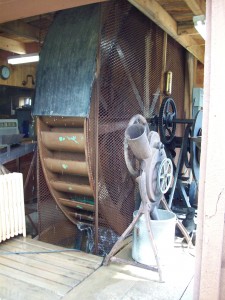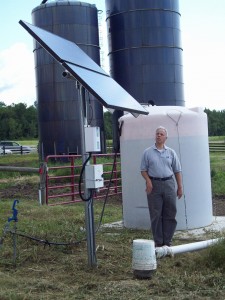The four field days hosted over 90 attendees total! I was able to attend 2 of the 4 field days that I helped to organize: Warren’s off-the-grid systems on August 5 and Bondi’s solar livestock watering on August 6. I enjoyed meeting the hosts and learning about the systems myself, but the best part was watching the attendees get to know each other and exchange ideas and information.
Sam Warren of On Warren Pond Farm in Trumansburg has been homesteading since the early 1990s. He’s installed his energy systems over fifteen years. The waterwheel was a curiosity for most people; they saw more practical application in the solar and wind technologies. However, the waterwheel runs many of Sam’s tools (e.g., a drill press) directly and simultaneously, which means that there’s no need to store electricity for later use. This field day hosted the largest group: we counted 36 people in attendance!

Sam Warren's homemade waterwheel
Bob and Mary Lou Bondi are just getting started with a small beef operation in a historic barn in Pultaney, NY. 19 people turned out to learn about Bob’s solar pump system for livestock watering, which was installed with grant assistance from the Finger Lakes Resource Conservation and Development Council.

Bob Bondi explains his solar water pump
Each farmer is exploring several different technologies to find what combination works best. The attendees were a diverse group; everyone was attentive and curious and they learned as much from each other as they did from the hosts. “Green” might be the buzzword of the day, but passion for renewable energy is present in such a varied population that I will be surprised if interest declines anytime soon.
It was truly a rewarding experience to see so many people show up partly because of my efforts. See more at my blog.
